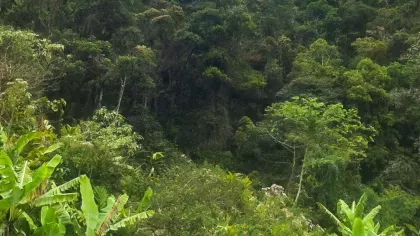5 March 2024
Meet Anna - the first Malagasy mycologist
For International Women’s Day 2024, Dr Anna Ralaiveloarisoa talks studying Madagascar’s fungi solo – from battling conservative attitudes to magical lemur encounters.

Dr Anna Ralaiveloarisoa has a lot of work in front of her. Almost all of Madagascar’s fungi is unknown to science – and she is the country’s only mycologist.
Less than 1% of Madagascar’s estimated 100,000 species of fungi have been studied. Of the 600 species known to science, Anna has named about twenty. After finishing her PhD in 2022, she’s now a post-doctoral researcher in the accelerated taxonomy department at Kew Madagascar Conservation Centre (KMCC), becoming the first ever Malagasy mycologist.
‘People think that fungi is not important. In the beginning even I thought mushrooms were toxic and would kill you. But fungi feeds so many of the plants in the world – so if plants are important, fungi is more important!’ she says.

Into the wild
Anna’s work takes her into forests across Madagascar, comparing local fungi in the rainforest climate of Ranomafana National Park and the drier scrubland of Andranomena Special Reserve in western Madagascar. Despite wind, rain, slippery ground, falling trees and occasionally dodging gangs of kidnappers and thieves, she loves getting away from her desk on her field trips.
‘I love hearing lemurs singing in the forest in the morning. That's my favourite time. And I really love collecting. On the first day of a trip I’m like, “Hi mushrooms, happy to see you again!”’

Once Anna collects a specimen, it needs to be dried – a challenging task outdoors in the tropical humidity. Then it’s a race against time to study the specimens before they start to decay.
Backups are sent to the Fungarium at Kew Gardens where they can be stored in carefully controlled conditions. Anna’s biggest ambition is to one day open the first dedicated mycology lab and fungarium in Madagascar.

Naming fungi to save them
Anna also teaches at the University of Antananarivo, where she’s keen to get more students into mycology. Like Madagascar’s endemic plants and wildlife, its native fungi are under threat – but they’re so understudied that no one can say for sure how many of Madagascar’s fungi species are found nowhere else.
‘I'm trying to explain to the students how important fungi are and that they should get into mycology as fast as they can. I want to invite everyone to study Malagasy fungi, because a lot of it might disappear soon due to deforestation,’ she says.
As an MSc student, Anna had planned on studying plant anatomy. It was only after her dream research project went to someone else that she considered a mycology project. Gradually, the mushrooms won her over – helped along by the mentorship of her PhD supervisor, Finnish mycologist Dr Tuula Niskanen.
Anna still has a soft spot for Hygroaster madagascarensis, the first species she ever described.
‘I had a lot of struggles. I remember I cried a lot when I wrote the paper,’ she says.

‘Don’t give up’
A career in science is no small feat as a Malagasy woman.
‘Here in Madagascar, most scientists are men. When you are a woman about 25 years old, people start asking why you’re not married yet. Then if you have a baby, some organisations don’t want to employ you because they think you can only give 50% of your focus to your job.’
Anna has seen talented classmates forced to quit academia after having children. Once, in a previous role, Anna was told that if she got pregnant she would have to leave her job and pay back the project funds. Outside of work, partners might not understand the importance of science or why a scientist needs to spend time away from home on field trips.
Anna is determined to one day balance a family with her work. She says more organisations offering jobs would make all the difference for Malagasy women scientists.
‘We don’t have to abandon our careers. Don’t give up.’


The next generation
A new generation of mycologists is the best hope for Malagasy fungi. Anna plans on one day becoming a professor and launching a university department of mycology.
‘It's not only about naming fungi, but also studying their ecology and their importance in pharmacology and in our lives. That’s the most important thing to do to study Malagasy mushrooms faster, because I would never finish it by myself,’ says Anna.


